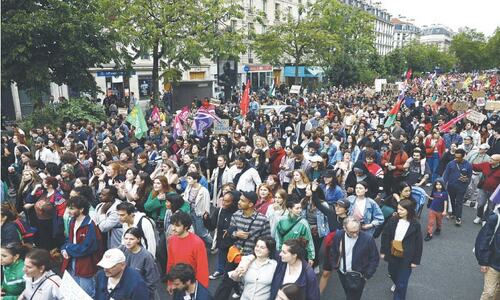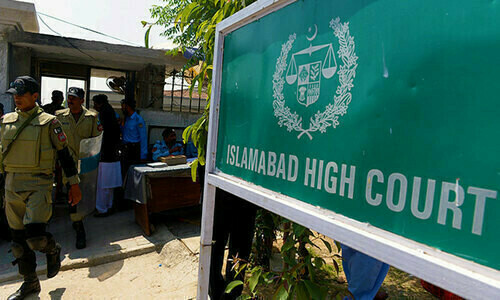MOSCOW: Russian lawmakers were given 10 days on Monday to study how best to revoke Moscow’s ratification of a landmark treaty banning nuclear tests, after President Vladimir Putin held out the possibility of resuming such testing.
Russia’s envoy to the Comprehensive Nuclear Test Ban Treaty Organisation (CTBTO) said on Friday that Moscow would revoke its ratification of the pact, a move that Washington denounced as endangering “the global norm” against nuclear test blasts.
The step is viewed by some Western security analysts as a pointed reminder from Moscow that it still possesses the world’s largest nuclear arsenal at a time when it is locked in a standoff with the West over Ukraine.
A nuclear test by Russia, designed to signal resolve and evoke fear, could encourage others such as the United States or China to follow suit, starting a new nuclear arms race between the big powers, which stopped nuclear testing in the years after the Soviet Union’s collapse in 1991.
Putin said last on Thursday that Russia’s nuclear doctrine — the conditions in which he would press the nuclear button — did not need updating.
However, he said Russia could look at revoking ratification of the Comprehensive Nuclear Test Ban Treaty (CTBT) to bring it into line with the United States, which has signed but not ratified the document.—Reuters
Russia’s top lawmaker, Vyacheslav Volodin discussed the matter with parliamentary leaders on Monday and said revoking ratification would be in the country’s national interest.
He and the other parliament bosses gave lawmakers on the International Affairs Committee 10 days — until Oct 18 — to study the ratification option, according to a statement from the State Duma, the lower house of parliament.
The International Campaign to Abolish Nuclear Weapons (ICAN) urged Moscow to think before acting. “Russia must drop its reckless threat to leave,” ICAN said in a statement.
“International treaties... are critical to making sure nuclear testing, which has harmed people’s health and spread lasting radioactive contamination, is not resumed.” Daryl Kimball, executive director of the Washington-based Arms Control Association, has said the move could “take Russia and the world backward to a dangerous era of tit-for-tat nuclear threats”.
Nuclear testing
The Ukraine war has raised tension between Moscow and Washington to its highest since the Cuban Missile Crisis of 1962, just as China seeks to bolster its nuclear arsenal to match its status as an emerging superpower.
By revoking the ratification, Russia is sending the United States a warning that Moscow can fundamentally change the assumptions of post-Cold War nuclear planning.
Signed by 187 countries and ratified by 178, the CTBT cannot enter into force until eight specific holdouts have signed and ratified it.
The United States, China, Egypt, Iran, and Israel have signed but not ratified it. India, North Korea and Pakistan have not signed. The Soviet Union last tested in 1990 and the United States in 1992. Russia, which inherited most of the Soviet nuclear arsenal, has never done so. But signs have emerged that testing could resume.
Published in Dawn, October 10th, 2023













































Dear visitor, the comments section is undergoing an overhaul and will return soon.